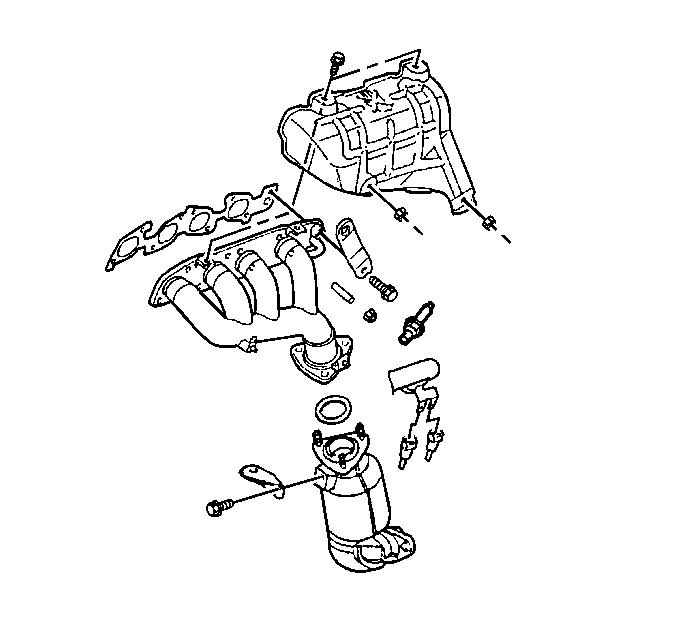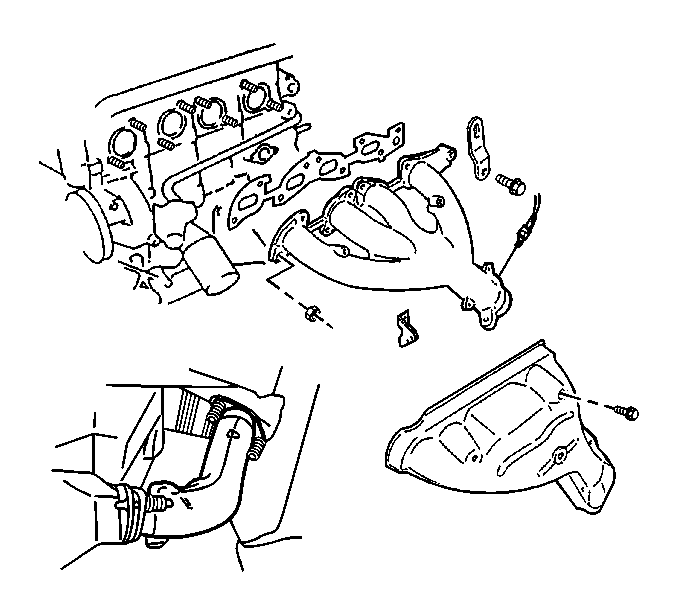Exhaust Manifold Replacement 2.0L Engine
Removal Procedure
Caution: In order to avoid being burned, do not service the exhaust system while
it is still hot. Service the system when it is cool.

Important: California emissions vehicles are equipped with an additional catalytic
converter (PUP catalytic converter) and a different exhaust manifold from
federal emissions vehicles.
- Perform the following if the vehicle is equipped with the PUP catalytic
converter:
| 1.1. | Remove the 3 bolts and 2 nuts and remove the exhaust manifold
heat shield from the exhaust manifold. |
| 1.2. | Remove the 3 nuts and separate the front pipe/catalytic converter
assembly from the exhaust manifold. |
| 1.3. | Remove the engine mount-to-front pipe/catalytic converter assembly
bracket. |
| 1.4. | Remove the exhaust manifold-to-engine block bracket. |

- Perform the following
if the vehicle is not equipped with the PUP catalytic converter:
| 2.1. | Remove the 4 bolts and 1 nut and the exhaust manifold heat shield. |
| 2.3. | Remove the two bolts and separate the front pipe assembly from
the exhaust manifold. |
| 2.5. | Remove the exhaust manifold-to-engine block bracket. |
- Disconnect the oxygen sensor electrical connector.
- Remove the oxygen sensor from the exhaust manifold.
- Remove the 1 bolt and 8 nuts from the exhaust manifold.
- Remove the exhaust manifold, the engine lift hook, and the gasket
from the cylinder head.
Installation Procedure

- Perform the following
if the vehicle is equipped with the PUP catalytic converter:
| 1.1. | Install the new exhaust manifold gasket to the cylinder head. |
Notice: Use the correct fastener in the correct location. Replacement fasteners
must be the correct part number for that application. Fasteners requiring
replacement or fasteners requiring the use of thread locking compound or sealant
are identified in the service procedure. Do not use paints, lubricants, or
corrosion inhibitors on fasteners or fastener joint surfaces unless specified.
These coatings affect fastener torque and joint clamping force and may damage
the fastener. Use the correct tightening sequence and specifications when
installing fasteners in order to avoid damage to parts and systems.
| 1.2. | Install the exhaust manifold and the engine lift hook to the cylinder
head. Secure the exhaust manifold with the 8 nuts and 1 bolt. |
Tighten
Tighten the 8 nuts and 1 bolt to 50 N·m (37 lb ft).
| 1.3. | Connect the lower exhaust pipe to the exhaust manifold with a
new gasket. Secure with the 3 nuts. |
Tighten
Tighten the 3 nuts to 50 N·m (37 lb ft).
| 1.4. | Install the exhaust manifold heat shield to the exhaust manifold.
Secure the exhaust manifold heat shield with 3 bolts and 2 nuts. |

- Perform the following
if the vehicle is not equipped with the PUP catalytic converter:
| 2.1. | Install the new exhaust manifold gasket to the cylinder head. |
| 2.2. | Install the exhaust manifold and the engine lift hook to the
cylinder head. Secure the exhaust manifold with the 1 bolt and the 8 nuts. |
Tighten
Tighten the 8 nuts and 1 bolt to 50 N·m (37 lb ft).
| 2.4. | Install the front pipe assembly to the exhaust manifold with
a new seal. Secure the assembly with the two bolts. |
Tighten
Tighten the exhaust manifold-to-front pipe assembly bolts to 50 N·m
(37 lb ft).
| 2.6. | Install the exhaust manifold-to-engine block bracket. |
| 2.7. | Install the exhaust manifold heat shield to the exhaust manifold.
Secure the exhaust manifold heat shield with 4 bolts and 1 nut. |
- Apply anti-seize compound to the threads of the oxygen sensor.
- Install the oxygen sensor.
Tighten
Tighten the oxygen sensor to 45 N·m (33 lb ft).
- Connect the oxygen sensor electrical connector.
- Inspect the exhaust system for exhaust gas leakage.




